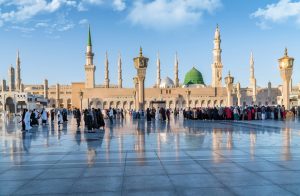Preston Mosque is now open and welcomes you.

Islam is a religion that fundamentally seeks to address personal and spiritual development. The Holy Quran emphasises the uniqueness and individuality of man, and gives a definite view of their destiny as a unity of life. The knowledge of God is the first milestone whereupon Islam in its entirety hinges, without this knowledge any action is without value or essence. This knowledge is gained to form a relationship and intimacy with God. In order to achieve the love of God, one must be willing to incorporate the knowledge of God within themselves. Islamic spirituality focuses on the relationship with God that affects an individual’s self-worth, sense of meaning, knowing of one’s self and the connectedness with others and nature (Nasr, 1997). Philosophical and mystical scholars in Islam have been exploring the attachment and knowledge of the Divine, in relation to the knowledge of the ‘self’. According to philosophers, the knowledge of the ‘self’ is a type of psychology, a general concept that stems from a branch of knowledge among others. However, mystics interpret the ‘self’ as being much deeper then the soul, that self-knowledge is the way to the Divine and the ultimate goal of mysticism (Ghazzali, 2002). Scholars have found that an individual that knows God’s capabilities and qualities will know Him better, or understand that God has perfect version of these qualities and attributes, and that as human beings they are mirrors and an index of the names and attributes of God (Ghazzali, 2002). In addition, they have explored the concept of nature being to the Divine self as character is to the human self, in the picturesque phrase of the Qur’an it is the habit of Allah (Baqutayan, 2012). The knowledge of the self is the key to the knowledge of God, according to the saying of Prophet Muhammad, ‘Whosoever knows himself knows his Lord’ (Chittick, 2010). The knowledge of horizons and of our self is an intermediate to the knowledge of God, and the knowledge of God through his names and attributes is an intermediate to the knowledge of the self.
Islam interprets the development of the self as to be reflecting the various facets of God, however the human self is distinct to the self of God (Manzoor-ul-Haque, 2015). The ‘nafs’ as the ‘self’ is called in the Qur’an has several meanings, it could mean the various stages of the soul or the elements that construct the metaphysical nature of humans or even the fitra(Manzoor-ul-Haque, 2015). As Al-Ghazzali, a famous scholar, puts it, “the gnosis or yourself is the key to the gnosis of God”(Ghazzali, 2002, p. 41) it refers to one’s being and essential reality (which the Qur’an calls the inspired divine ‘spirit’) and not the other definitions of the self. On definition from the Qur’an is the three stages of the soul, which include the ‘blaming self’, the ‘egotisical self’ or the ‘reassured’ self (Zarabozo, 2002). There are two types of people, those whose nafshave overcome them and lead them to ruin, and those who overcame their nafs. This important phenomenon of the human self is that it is neither good nor evil in itself, but its use makes it good or evil. In this particular case, scholars discriminate it from the human self and classify it as the ego. Scholars call it ego, others refer to it as the carnal soul. The alternate meaning to nafs is the elements that construct the metaphysical nature of human beings, which include emotions, desires, intellect and imagination (Zarabozo, 2002).
Lastly, the self could refer to the fitra which is a word derived from arabic to mean disposition or nature (Dogan, 2014). Islam itself is often called the religion of al-fitra, as it is a religion of human nature, as God created man upon the fitra, primordial human nature (Dogan, 2014, p. 2), which is a state of purity innately inclined to practice the stipulations of Islam and be the perfect Muslim (Baqatayan, 2012, p. 165). According to this view, the fitra is the faculty which God has created in mankind of knowing God. The meaning is affirmed in the Qur’an, “Set your face to the religion in sincerity which is Allah’s fitraupon which He created mankind,” (Qur’an, 30:30). A human can be worthy of entering Paradise (Nursi, 2008, p. 319) and seeing God Himself on the condition that he is true to his Fitrah (Qur’an, 30:30), submits to God and purifies his soul,Tazkiyah al-Nafs (Zarabozo, 2002, p. 57). It is the social circumstances after birth that deviates an individual from fitra. For instance, if an individual follows a destructive path it is not a result of an innate wrong within their nature, but the outcome of the emergence of the lower nafs after birth. The self can be explored in the numerous ways, it is a notion that requires true introspection in order to understand the truth of one’s own self. It is the self which acts as a veil that screens an individual from God, and if one is unaware of the reality of the self then the consequences and effects can be seen on the state of their spiritual awareness. In the hadith of the Prophet Muhammad, the meaning referred to is of the soul that which is spiritual, the divine substance that leads one to discover the Lord through one’s truth and one’s innermost reality.
The different conceptions of the human facilities which ultimately leads to ways of knowing, including the different approaches of knowing God, are reflected in the controversial interpretation of a prophetic saying ‘Allah created Adam in His own image’ along with the Quranic verse that God created man in his image and breathed his spirit into him (Qur’an, 38:72). This hadith and Quranic verse allowed for the exploration of knowing God within ourselves, however to understand them the fundamental aspect of Islamic spirituality, the transcendence of God and dissimilitude from created things must be understood. This is conveyed in multiple verses in the Qur’an, whereby God Himself states, “There is nothing whatsoever like Him,” (Qur’an, 42: 11). It is human nature to have this curiosity that which mystifies, but it has led to the fallacy of mankind’s desire to understand God. Mankind has fallen into the error of putting a face on God, describing God’s features according to one’s understanding of the universe. Humans tend to ascribe God’s appearance to what they know, it depicts man’s own arrogance as they give God features similar to their own. This is not a behaviour limited to followers of Islam, but to those a part of different cultures. For instance, in European art God is depicted as a caucasian, while in African art with African features. Man’s knowledge is limited, the Qur’an emphasises this and denies God’s likeness to anything, never will man grasp God’s true nature. The features God ascribes for Himself cannot be described or given a physical embodiment. Among the interpretations of the scholars, the word “image” refers to “attributes” of God, such as hearing, seeing, knowledge and furthermore (Chittick, 2010). Thus, Adam was created possessing these attributes God described Himself with in the Qur’an, however the attributes of Adam is limited and relative, while the attributes of God is eternal and absolute. In addition, by Adam being created in ‘His image’ he is considered a direct creation, as Adam was not born and did not experience the embryological stages of birth. The Qur’an states God’s uniqueness, as “He is Allah, Absolute Oneness,” (Qur’an, 112:1) hence no human can be in the likeness of Him, however the concept of Him “not born” is an aspect explored in the creation of Adam. It also indicates that Adam was characterised by the same ‘image’ or form on earth as he was in heaven, without any changes until his death. To reinforce this, the prophet emphasised that “The first group to enter Paradise will be in the image of the moon,” (Dogan, 2014). The interpretation refers to the first group being in human form but due to their purity, beauty and the brightness reflected from their faces they will look like the moon, so they are likened to it but not resembling it. Hence, for God to be in the image of a thing does not mean in the literal sense.
In the philosophical approach to the hadith, the meaning of the ‘nafs’ is the ‘soul’, the spiritual essence beside the body. The knowledge of God focused by philosophers is through His activities and attributes, and not knowledge of his essence. Philosophers explore the similarity between the soul’s activity in body and God’s activity in the world. This soul-body reference is considered as a metaphor of God-world relation (Ghazzali, 2002). The human soul is not ascribed to any part of the body, it is not a hand, not a foot, not the faculty of hearing and seeing etc. However, no organ nor faculty of the soul is empty of the existence and commands of the soul. Similarly, the world is under the continuous command of the omnipresent creator, yet God cannot be ascribed to a specific place. Ibn Arabi, a famous scholar uses this metaphor to emphasise this concept, “The cosmos is to the Real (God) as the body is to the spirit. Just as the spirit is not known except through the body [so also the Real is not known except through the cosmos]” (Ghazzali, 2002). The way in which the soul governs the body and controls it through its human faculties, is reflected in God’s sovereignty of the affairs of the world by means of His divine attributes. The concept of God’s “oneness of being” is paradoxical, as it rises from accepting one being in its unity and simplicity that has many different attributes, names and self-disclosures. A model of this can also be found in the human soul, this duality of “one’s” whereby it is one at the same time as it is many. The soul in its simplicity and unity is controlled by the different faculties of the body and appears in the different activities of the human being. Although the act of seeing, hearing is different to knowing or thinking, the seer, the hearer, the knower and the thinker are controlled and completed by one thing, the soul. The act of seeing does not inhibit the act of hearing, nor does it prevent it from knowing or other activities. In comparison to God, no activity prevents Him from doing another activity simultaneously. For example, God accepts prays, responds to them and governs the world simultaneously. Humans have a limited ability to help others with finite possessions and resources, and only through God’s will, but God is able to feed, nourish and sustain the entire universe with no loss of his possessions, without fatigue and effort. He just says “be, and it is” (Qur’an, 2:117). Humans’ ability to connect to the Divine-Eternal Being (Goodman, 1984, p. 29) is a unique feature that contributes to their significance.
The soul governs the body and controls it through its faculties, in the same way in which God governs the affairs of the world by means of the divine attributes. The knowledge of the signs within creation allow for the exploration of God, it is mentioned by Ibn Arabi, “ He has shown Himself to us through us. We describe Him by no quality without ourselves being that quality.”(Ghazzali, 2002). This indicates the importance of knowing God by what He says about Himself through the revelation. Ibn ‘Arabi states that God reveals Himself to humans through His Signs in all creation, including their own nafs, in the words of the Qur’an, messengers and his companions, and through all the inspired forms of revelation. It is an active journey to recognise God’s signs, in the totality of human experience, to open one’s spiritual eyes to the reality of ‘things’ as signs, and to recognise the active presence of God and divine names in one’s own state. Scholars have emphasised the importance of perceiving the direct relationship between all of creation and the divine names and attributes (al- Asma-al-Husna). Creation as an outward manifestation and as an inward spiral awareness (Dogan,2013). Everything that exists and is experienced in reality is the manifestation of the different divine names. Through possessing microcosmic versions of His attributes, humans are thus made capable of appreciating God’s infinite power and relating to Him. For example, one of God’s names is “Al-Wadud” meaning the loving one, it is not characterised by emotions as emotions involve physiological change and one’s state of consciousness. However, the name manifests itself in many ways in the life of a Muslim and the world. It is emphasised in the Qur’an, “Verily, Allah loves those who do good” (Qur’an, 2:195) and also in hadiths, “Allah is beautiful, He loves beauty” (Sahih Muslim, book 61). God’s beauty can be reflected in human-beings so that humans are effectively mirrors to His attributes (Aymaz, 2011, p. 4). At the level of immanence, the created order of the cosmos, humanity and individual being is understood on the basis of God’s divine names and attributes. Muslims believe that studying these names and attributes brings ones closer to understanding and strengthening one’s relationship with God. Divine attributes are archetypal entities through which divine actions are explored, as each attribute nourishes a kind of consciousness and humility in man leading to constant evaluation of one’s character and actions (Abbas, 2016).
The ninety-nine divine names of God encompasses every being, indicating that God is manifest in His attributes within human’s composite structure (Hulusi, 2001), they are an object manifesting a certain attribute of God by virtue of the various properties that are found in them while they possess a specific composition. The divine attributes inherent within the divine essence becomes manifest through the divine names of God. For example, the divine attribute of Will (Mureed) is inherent in every soul, however due to every individual’s innate disposition (fitra) each individual’s strength of will differs. Moreover, donating to the poor is implementing His qualities, ‘Razzaq’, Sustainer and ‘Rahim’, merciful. However, this implementation is to a finite extent with limitations that do not apply to God. Human beings do not share qualities of God which relate to His essence, but they represent God’s names and attributes in the human dimension.
In conclusion, the Nafs has several interpretations and the Hadith of knowing one’s self to know God can be divided into two approaches, the philosophical and the mystical. The relationship between individuals and God in Islamic spirituality requires distinguishing two views of God’s relationship with creatures, immanence, and transcendence. The philosophers refer to the soul and its similarity to God as is explored and found in its activities and attributes. In this view, the knowledge of the soul, is the knowledge of something, as the soul of man can be seen as a model of God’s attributes and activities. While the mystics, understand the Nafs as the ‘self’ instead of the ‘soul’, and interpret the Hadith as a unity with God, not of its similarity. It refers to human existence, as ‘who knows his existence knows his lord’. Most Islamic scholars like Ibn Arabi and Al-Ghazzali believe that God, in His essence, is the transcendental unity who is majestic and beyond any human comprehension (Ghazzali, 2002). However, by contemplation of his own being, and at the level of immanence, the divine life cannot be detached from the created order and man can arrive at some knowledge of God.
References
Aymaz, Abdullah. The Fruits of Worship. Clifton, N.J: Tughra Books, 2012. “Know Yourself, Know Your Lord”. Muntadhir Abbas. The Muslim Vibe. Last modified June 24, 2016. https://themuslimvibe.com/ faith-islam/spirituality/know-yourself- know-your-lord.
Baqutayan, S. (2012). The innovation of human nature in Islam. Innovation2, 1(2012): 162-173.
Chittick, William C. The Sufi path of knowledge: Ibn al-Arabi’s metaphysics of imagination. Suny Press, 2010.
Dogan, R. The Position of the Human Being in the Universe according to Islam. Horizon Research Publishing Corporation1, 3 (2013): 140-150.
Dogan, R. The Nature of Man in Islam. International Journal of Religion & Spirituality in Society 4,3 (2014): 27-39.
Ghazzali, A. (2002). Al-Ghazzali on knowing yourself and God (Nur Abdus Salam, M Trans). Chicago: Great Books of the Islamic World.
Goodman, N. (1984). Of mind and other matters. Harvard University Press.
Gulen, M. Fethullah. Emerald Hills of the Heart: Key Concepts in the Practice of Sufism 1. New
Jersey, USA: Tughra Books, 2009.
Hulusi, Ahmed. 2001. The Universal Mysteries. 1st ed. Istanbul: Kitsan Publ
Kathir, I. (2003). Stories of the Prophets(Translated by RA Azami). Jeddah: Darussalam Publishers.
Manzoor-ul-Haque. “Quran’s Concept of Self”. Bazme Tolue Islam North America. Last modified August 8, 2015. https://tolueislam.org/qurans-concept-of-self-dr-manzoor-ul-haque-2/.
Nasr, S. H. (1997). Islamic spirituality: Foundations. New York: Crossroad Publishing Company Nursi, S. (2005). The Words: the reconstruction of Islamic belief and thought. New Jersey: Tughra Books.
Zarabozo, J. A. D. M. (2002). Purification of the soul: Concept, process and means. Al-Basheer Publications & Translations.



Great work on this thought-provoking post. Your style is engaging and your thoughts are well-articulated. Looking forward to more posts.